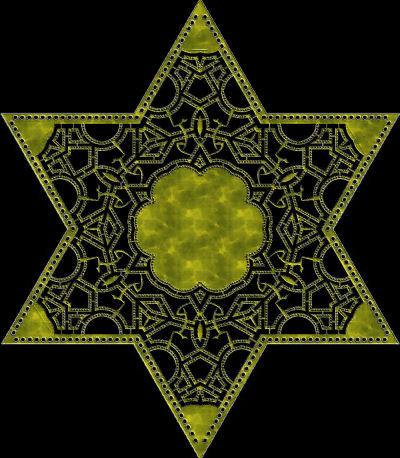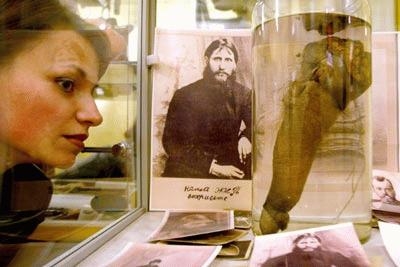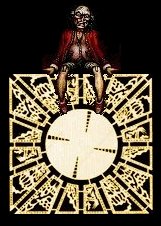FILIGREE AND SHADOW
"The Hofesh Configuration"
"Rasputin's Perdition"
"The Sinner's Ressurection"
Original box design and research by José Leitão

FILIGREE AND SHADOW
"The Hofesh Configuration"
"Rasputin's Perdition"
"The Sinner's Ressurection"
Original box design and research by José Leitão

|
"My dear Martyr, give me thy blessing that it may follow me always on
the sad and dreary path I have yet to follow here below. And remember us from high on your holy prayers. Alexandra" - Note written by the Tsarina Alexandra placed over Rasputin's casket. |
Grigory Yefimovich Novykh, born in January 10th, 1869, climbed his way to the highest social circles of St. Petersburg to become advisor to Tsar Nicholas II, confessor to Tsarina Alexandra Feodorowna, and many say the "man in the shadow" with power to remotely control, to an extent, all of Russia.
He was born in the village of Pokrovskoe in Siberia. At the age of 18, he joined for a year the Russian Orthodox Church sect of the Khlysty (Men of God) in the monastery at Verkhoture, studying to become a monk. Even though he was never ordained, he would later don the robes of a monk anyway. At the age of 19, he left the monastery, got married to Prascovie Dubrovin, and fathered four children (one other died early).
The Khlysty had an interesting doctrine: they proclaimed that 'sin' was not an act man performed due to some kind of inherent evil; it was brought upon by ignorance. Salvation was attained through ‘gnosis’, by enlightenment. There was an ever-renewing reincarnation of God in man which could happen anywhere, and anytime. They claimed that the birth of Jesus, when God became man in the bosom of the Virgin Mary, was not an isolated event, but was constantly being repeated throughout time and history. This reincarnation of God in man was brought upon by total self-denial and submission to the will of the Holy Spirit. Thus was achieved the ‘mysterious death’ by which the person would die to all sensations of the flesh, becoming no longer capable of sin. After this state, man would be ‘resurrected’. After this mystical transformation he would share in the divine abilities to heal, prophesy, raise the dead, and rescue souls from Hell.
Rasputin perverted these beliefs, believing that one was closest to the Divine when void of lust, in a state of 'holy passionlessness'. To achieve this state of course, the best way was sexual exhaustion. So he would engage in regular bouts of orgy, piously followed by flagellation and confession. It was a strange way towards redemption.
Rasputin continued his spiritual pilgrimages, traveling to places of religious significance such as Kazan, Mt. Athos, Greece and Jerusalem (twice), living off peasant donations. A self-proclaimed holy man or 'staret', Rasputin was said to hold the power to heal the sick and predict the future. Many would seek him asking for help, bringing their donations.
Notes from Rasputin's own diary of these journeys have him finding in Jerusalem a mysterious artifact. A strange, gilded box which reportedly belonged to a Jewish Goldsmith, Eléazar Beider. This commissioned box had been built for him in Paris by a French artisan and architect called Philip LeMarchand. He had named it Filigree and Shadow as a representation of the personalities involved in creating that joint commission, with some aspects using Eléazar's enormous skill at designing exquisite jewellrey.
How then, did this strange box find it's way into Rasputin's hands? The Jewish goldsmith Eléazar had called it the Hofesh Configuration (Hofesh meaning Freedom in Hebrew). Supposedly, the apparently harmless box would allow its possessor to release himself from the limits of flesh, granting him great power. How Eléazar came to use that power is uncertain. What is known is that he disappeared under mysterious circumstances near the end of his life. Legend goes that Rasputin bought it from the streets on Jerusalem, in the Via Dolorosa (the Way of Suffering; The Twelve Stations of Christ's bearing of the cross).
After returning to Russia, and according to Rasputin's daughter, the Black Virgin of Kazan (a purportedly miraculous Russian icon) appeared to Rasputin one day, advising him to go to St. Petersburg and heal the Tsar's son, Aleksei (who suffered from hemophilia). The political implications of this ‘apparition’ would be enormous.
Nicholas II Surrounded by Family: Duchess Olga, Duchess Marie, the Grand Duchess Anastasia,
the Tsarevitch Alexis, the Grand Duchess Tatiana and his wife the Tsarina.
Rasputin was first called upon to assist the royal family in 1907. The fact is the Tsarevich was indeed afflicted with hemophilia, and Rasputin managed to alleviate his crisis. Some say it was through the laying of hands, others that it was by means of hypnosis. Others claim a strange looking box was at the table, when he was soothing the Tsarevich.
Rasputin also met Harry Houdini when he was doing his European Tour (1900-1905), in St. Petersburg. The following is an excerpt from Orson Welles' Sketchbook Transcripts (Episode 4: May 14, 1955):
'I'd like to tell you my favorite story about Houdini, had to do with his visit to the Kremlin. The night he rang the bells in the Kremlin.
This was in a private performance for the royal family, for the tsar and the royal family, with Rasputin in the background, gnashing his teeth with jealous rage. And Houdini had asked for the various people in the small audience to write on slips of paper some impossible thing they would like to have performed. And one of them had written "ring the bells in the Kremlin, or so Houdini had arranged it so this would be chosen, apparently by free choice. And to ring the bells in the Kremlin may not sound like much, but as a matter of fact, at that time, there were no ropes connecting the bells, and for a century at least, they'd been silent.
So after this command, Houdini moved to the window, raised his arm, it was a snowy night; there was moment's very dramatic pause, and then, over the snow-covered square, there could be heard first very dimly, and finally, in full chorus…the bells of the Kremlin. You could imagine the effect of that! Particularly on Rasputin. Now ordinarily, I don't explain how tricks are done, no magician, amateur or professional, likes to do that, but in this particular case I think I can tell you that since it's unlikely that anyone will be doing this particular trick again. As Houdini raised his hand, his wife, who was standing at a window in a hotel at the other side of the square, which was right near the bell tower, his wife received the signal, and with an air gun, shot the bells…bing bong bong, like that. Always struck me as a particularly ingenious miracle, and of course, those kind of tricks are the best, really.'
Recently an item has surfaced that helps us delve deeper into this encounter between Rasputin and Houdini, and what they might have exchanged. This signed letter from Harry Houdini to Governor Giles in full:
"Just met our mutual friend Walter Trowbridge and gleaned from him the information that you are now in Russia. I sincerely hope that I shall have the pleasure of meeting you in Petersburg within the next 20 months. Best wishes and kindest regards sincerely yours..." Houdini adds in a postscript, "We sail for Germany August fifth." Boldly signed.
What makes this item special is the penciled note on the top right corner: "Houdini is said to have instruct Rasputin". On what? Parlor tricks? Hard to believe. Most likely, Houdini, a man with a deep interest in the supernatural, might have given Rasputin some hints on how to possibly solve the Hofesh Configuration. But what their topic of conversation really was, we will never know.
Rasputin grew widely accepted by the social and religious circles of the city, holding many meetings in his home, mostly women. He would often preach that physical contact with himself had a purifying and healing effect. Even the most reluctant would eventually yield to his forceful ways, and hypnotic gaze; sometimes he would simply ravish them. People talked in whispers about this unkempt, self proclaimed 'monk', who wielded such a tremendous 'sex magic'.
His ability to seduce and entice with his words as well as his eyes, brought about many rumors in St. Petersburg: his promiscuity was legendary; many high society women would pass by his couch, and by that time some lower class prostitutes would just as well be a prey to Rasputin's desires. Some would vanish; others would become strangely crazed: In the spring of 1914 Rasputin was savagely stabbed by Chionya Gusyeva, an ex-prostitute who claimed he was the devil.The Tsarina sent him her personal doctor the very next day.
While he recovered, Nicholas took Russia into the First World War, which would prove disastrous to Russia. After Nicholas II took personal command of his troops and went to the front, the Russian government became unable to support the tremendous political effort without the direct influence of the Tsar; so Nicholas put Alexandra in charge of Russia's internal affairs, with Rasputin as her advisor, who occasionally intervened in military matters, much to Russia's detriment. He even occasionally influenced the selection of church officials and cabinet ministers. When this was discovered, and since the Empress and Rasputin were in close contact, many believed that indeed it was Rasputin who had become the true lord of All the Russias. In these troubled times, the people referred to St Petersburg as 'Chertograd', or Devil Town.To top all this, there was the common rumor for some time now that the unwashed peasant monk always lavished by the Tsarina, also had her intimate favors of Alexandra, and boasted of this in public when drunk.
Something had to be done.A party of Aristocrats plotted to assassinate him: Prince Felix Yusupov, Dr. Purishkevich, and the Grand Duke Dimitri, a member of the Royal household.
The story goes that on the night of 16 December 1916, Rasputin was called to the Yusupov castle and once there, Felix tried to poison him with cakes and wine laced with potassium cyanide. When this didn't work, and Rasputin actually suggested that Yusupov played some music, he took out a revolver and shot him through the chest. After an hour, when they went to check the body after much discussion, Yusupov bent over the inanimate corpse to find Rasputin opening his eyes and gripping his neck with a raging scream. He got up, and tried to escape, but when the aristocrats overcame their surprise, they quickly followed him into the snow and shot again, finally felling him. He was then brought back into the castle and beaten repeatedly by the raging Yusupov in the face with a two pound dumbbell.
Finally they was tied, put into a car and thrown off a bridge into the icy waters of the Malaya Nevka (Neva) river. Post-mortem found that he was still alive after all that; in fact, he still tried to release himself from the ropes and swim, but finally drowned.
Rasputin had repeatedly prophesied that the Romanov dynasty was linked to his own fate: and a couple of months later, the Bolshevik Revolution broke out and less than two years later, Nicholas II and his entire family were executed by firing squad.
None escaped.
Rasputin's somber words were finally proved true:'I feel that I shall leave life before January 1. I wish to make known to the Russian people, to Papa, to the Russian Mother, and to the children, to the land of Russia, what they must understand. If I am killed by common assassins, and especially by my brothers the Russian peasants, you, Tsar of Russia, have nothing to fear, remain on your throne and govern, and you, Russian Tsar, will have nothing to fear for your children, they will reign for hundreds of years in Russia. But if I am murdered by boyars, nobles, and if they shed my blood, their hands will remain soiled with my blood, for 25 years they will not wash their hands from my blood. They will leave Russia. Brothers will kill brothers, and they will kill each other and hate each other, and for 25 years there will be no nobles in the country. Tsar of the land of Russia, if you hear the sound of the bell which will tell you that Grigori has been killed, you must know this: if it was your relations who wrought my death then no one of your family, that is to say none of your children or relations, will remain alive for more than two years. They will be killed by the Russian people. I go and I feel in me the divine command to tell the Russian Tsar how he must live if I have disappeared. You must reflect and act prudently. Think of your safety and tell your relations that I have paid for them with my blood. I shall be killed. I am no longer among the living. Pray, pray, be strong, think of your blessed family. Grigori.'
Rasputin's letter to the Tsar, December 1916.
Many claim Rasputin to have been nothing more than an illiterate peasant, who represented the worst of the 'Old Russia'; but how could this simple man have become so powerful? What granted him such easy access to mystical circles and social circles? What was the secret behind his undeniable charismatic character; his deep blue eyes, which seemed to have seen things not of this world?
It is unknown for certain whether or not Rasputin ever actually found his way about how to solve the Hofesh Configuration, but many point his suspicious 'Visitation' (referred to as the Black Virgin of Kazan) as proof that he did. Unfortunately, after his death the box disappeared. It was never documented, apart from a few sketchy drawings made of it by Rasputin's hand. To this day it has not resurfaced again.
Here we present a re-interpretation of the so-called 'David Star Face' based on Rasputin's valuable sketches (more to come soon):
Filigree and Shadow, also known as the Hofesh Configuration might have been the true reason behind Rasputin's amazing physical stamina, and sexual prowess’s. It remains unclear what the price for those abilities was.
The Tsarina Alexandra prepared burial arrangements on January 3rd 1916 in a corner of the park at Tsarkoe Selo. Nicholas and Alexandra threw earth on the coffin and the she and her daughters scattered flowers on it. Before the coffin was closed, Alexandra placed an icon on her friend's breast and a letter written by her own hand.
After all this however, his body was reported exhumed and burned by the mob in the revolution of 1917, reduced to ashes and scattered. Thus his remains are thought to be lost forever. However, for years there have been regular of sightings of his face in several places around the world; a re-incarnation or the risen form of the original Rasputin?
In any case, here is an anecdotal detail: the Russian Museum of Erotica allegedly has on display the preserved 30-cm penis of Rasputin.

"I sacrifice my husband and my heart to you. Pray and bless. Love and kisses - darling"
Telegram from the Tsarina Alexandra to Rasputin.
Other Readings:
"Rasputin: The Last Word" by Edvard Radzinsky. Weidenfeld & Nicholson, 16 March 2000.
